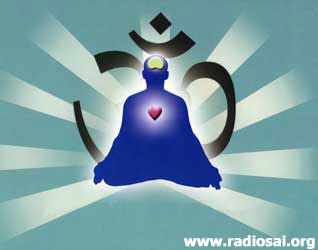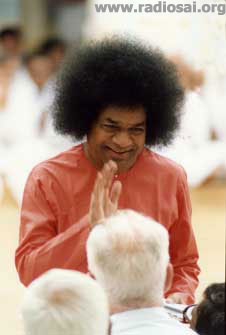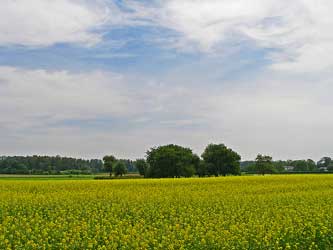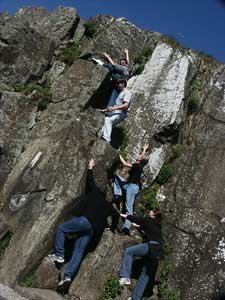THE SIX LANDSCAPES OF LOVE…AT WORK
By Dr. Jack Hawley
Dr. Jack Hawley, is a management consultant and a prolific author. His works include Reawakening the Spirit in Work: the Power of Dharmic Management, and The Bhagavad Gita: a Walkthrough for Westerners.
When Swami directed me to write a book on Dharmic Management, I figured it would be a straightforward task. But the closer I came to the thicket of issues facing people at work, the more profound the issues became. I found myself entangled in the big questions of life – questions about spirit, character and faith, detachment, fear and freedom. (The book was eventually published as Reawakening the Spirit in Work: The Power of Dharmic Management, Berrett-Koehler, 1993.)
I also began to suspect that the immense but elusive topic of love had to be included in the book. Swami tells us repeatedly that love is the mightiest force on earth. In practically every discourse, He reminds us that there is nothing higher than love (minchindi ledu in Telugu). Nothing!
And yet, people around the world are still reticent about this stupendous subject. “Love,” they gasp, “...on the job?” Nobody talks about it in depth. They shy away from it as if it’s taboo.
I even got the opportunity to test this with Him at Kodaikanal. “Yes!” He replied immediately, the affirmative leaping from His lips. Then He added more slowly, for all to hear, “Love is God.” How could I even think of doing a book about Bhagavan Baba’s spiritual and moral teachings without embracing this grand topic, without putting God in it?
Writers of management books dodge hard to pin down the idea of love because to them Love is for poets or philosophers, not pragmatists. Management writers don’t really understand what love is. Like everybody else (including me at the time), they think they know, but they don’t. They narrow it to just a minor facet of love; for example, love as a relationship between people. Most people just don’t really comprehend the colossal immensity and relevance of Love in all of life, as well as life at work.
As Swami directed, I began writing about Love at work, but even then, the closer I got to it the more I found myself stumbling. Over and over again I started and tripped. “Om Sai Ram, please help me,” I mantra-ed. |
|
 |
My wife and I were called in for an interview. Bhagavan told the others in the room, all Indians, “This foreigner is writing a book on dharmic management.” Then He looked kindly at me and said, “You write too slowly because you are afraid that your words may not be what I would say.” Then He added, carefully enunciating each word, “Your inner voice is Me.” These were the most important words ever spoken to me.
Back at my writing, I still grappled with how I might help my readers breathe in this boundless subject. Swami’s guidance came: “Smaller breaths.” In other words, don’t even try to inhale all of it, parcel it into segments. I ended up writing five complete chapters on “Love and Reverence in Work and Life.” The basis of those chapters, revealed piece by piece to me over several magical days, is a conceptual model that helps readers grasp the width and breadth of love.
In the model, love is sorted into six parcels: Love as Desire, Emotions, Action, Selflessness, Energy, and Spirit. The parcels are arrayed next to one another, stair-stepped according to a rough idea of spiritual scope and intensity.
The whole array, called The Six Landscapes of Love, lends itself to an imaginary journey from the lower levels up to the highest reaches of this glorious subject.
|
|
Love as Desire (Wanting Love)
We begin our journey at the lowest parcel. What looked like drab sameness from high above is really a choppy, gray-green sea. The first landscape turns out to be a dark and forbidding seascape, the Ocean of Desire. We find ourselves thrashing about in a cold and dangerous sea teeming with countless millions of people. We hear the word love bandied around loosely. “I love my car”; “I love that show”; “I would love to have that.” It’s the same word but it means the exact opposite of love – possessiveness and desire.
Greed and gratification is the game here. When one desire is swallowed, another surfaces to take its place. Voracious, shark-like creatures named Anger, Craving and Attachment are also thrashing around here devouring everything in sight. This is a fake love place. Real love contains no possessiveness. |
Swami often warns us about becoming submerged in this cold Kali Yuga sea. We shiver, and begin to see more clearly what Swami means when He talks about “self-fish.”
Love as Emotion (Feeling Love)
We leap from the murky sea to continue on our heart mission, rising above rocky shores and soaring over a pleasant grassy plain. Dry and warmer now, we see love as a familiar set of emotions – the feelings of love.
This is the love we’re reminded of when the word love is used – love most recognizable as a sentiment between people. The main constituents are fondness and attraction, a super magnified liking for someone. Your breath quickens, your heart skips a beat and you feel a catch in your throat when the object of your love comes into the room.
This love is woven into our culture. We’ve heard thousands of love songs thousands of times each. The words and sentiments constantly go around in our heads, programming and shaping us. We’ve seen countless love stories played before us throughout our lives. This is love as the many splendored thing. Every one of us experiences this wondrous love as actors in our own love stories. That’s what makes this place so comfortable. |
|
|
|
|
Love as Action (Doing Love)
We somewhat wistfully rise above the cozy plains of emotional love and move on. The smooth plains begin to gently roll, until we find ourselves in a region of scenic foothills – the Action Hills. This is where love is defined as doing, actually doing love. Love, in this country, is made of the daily acts of love that living beings perform.
This is where the sentiment of love becomes obvious/plain/evident as tangible behavior. This is the place where people actually perform genuine kindness, giving, helping, friendliness and team play. Action-oriented people embrace this definition because there’s more substance in it. The feelings of love in the preceding landscape are supplanted by concrete acts of love here. To love activists, this is “real” love. To the people here, love is doing, not just feeling.
Things begin to change profoundly at this level. Swami repeatedly tells us that the simplest, surest, quickest, and best way for us to show our love for others (and Him) is through helping others – loving through the acts of service, or seva. At this landscape, God’s presence becomes more perceptible. |
Love as Selflessness (Giving Love)
Proceeding on our mission, the gentle hills become steeper and we find ourselves in the towering Selfless Mountains. There’s something quite different about this place. Love here is less of a game. We have left some baggage behind.
The “baggage,” as Swami puts it, is our conditioning. People are conditioned from childhood to use love as a lever in their relationships. They learn early that love is a give-get competition. You give a little love, and then wait until you get some in return before you give a little more. At any point along the way, if you get nothing in return, the game stops abruptly. This love bartering becomes a habit and is largely unconscious.
But here, at this selfless level, the love is just given, with no expectations of return. As Swami so often says, the love here is freely given, as the tree gives its shade or its fruit – simply because it is its nature to give.
As an example of this, I recall an incident with our son Owen.
|
|
|
Owen (people called him Oh) had just turned seven years old. He didn’t get it yet that you ration out your love. He’s just a bright-eyed little boy. His best friend was Davey, and Davey’s birthday was approaching. Oh was excited. He loves Davey, and the love is still clean and freely given.
But a funny thing happens; he doesn’t get invited to Davey’s party. The long awaited day arrives and Oh can’t wait. “Mom, let’s go right now and buy Davey’s present.”
Louise’s heart sinks, “But you haven’t been invited to the party.” The little boy dismisses her comment with a puzzled glance that says, “What does that have to do with it?”
They drive to the store. Oh happily picks out the present and they have it wrapped.
When they stop in front of Davey’s house, noises of a children’s party float from inside. Louise didn’t know the party would start this early. She glances at the passenger seat.
Oh springs from the car, present in hand, flies up the front steps and rings the doorbell.
Davey’s mother comes. Oh, smiling ear to ear, hands her the present. “This is for Davey,” Oh beams. She’s speechless.
Davey appears at the door. Oh snatches the present from the mother and thrusts it into Davey’s delighted hands. “Happy birthday, Davey,” he says. “Gee, thanks, Oh,” says Davey. Owen, totally pleased, turns and skips off the porch, glowing.
Love here in the selfless mountains is deeper, purer, and simpler. Something mysterious and special occurs between the giver and receiver of it. The space between them fills and overflows with this quality. The secret is selflessness. There is no ego-self in this love. When we love in this manner we leave the worldly ego behind.
During our times of selflessness we are given a glimpse of the highest peaks beyond the clouds, where there are forces mightier than our ego. Selflessness is the magic that connects us with these highest forces.

|
|
Love as Energy (Powering Love)
We lift into the highest peaks, aware that we are passing through another boundary, moving from the pull of the worldly toward the pull of the spirit.
We have entered the invisible, vibrating world of love as a collection of energies. Love here is not a mode or a type of love; it’s beyond form here. Love, at this high level, is invisible vibrations. It’s the very power that draws us to love. It’s the force behind the various forms of love we have visited at lower levels.
Love here is the motive force, the driver of everything else. This love reaches out and touches the world and every soul in it. Not a thing moves on the planet without this love energy. This love is the inner voice of God speaking to and through us. It’s the universal and primordial inclination within each of us to love and be loved.
|
It is this love that drives the new conceptualization of management and leadership toward which Bhagavan Baba has pointed us. It is therefore not only relevant, but necessary for us to frequent these higher levels of love. Being aware of and able to draw upon this energy is a requirement of superb management nowadays. Tapping into this love energy is our audacious mission today.
Love here is also the inner goad to grow spiritually. It’s the innate sense in all of us to move toward our true Self. This is the empowering energy deep within every soul on earth now, and in all those whoever have been. It’s like magnetism. We can’t see it or feel it, and at times we even forget about it, but we live with this mighty, mysterious pull of love every moment of our existence. Indeed, this energy, this love-force, is our existence itself.
Love as Spirit (Being Love)
Brimful of this wondrous energy, we lift from the high peaks and zoom almost straight up, crossing a final boundary and bursting free, as if moving beyond anything worldly. We soar into a vast, limitless quiet, a nothingness in which there is no sense of up or down, no awareness of time or space.
This is far beyond our worldly experience, and yet, curiously, there is something familiar here. Although we are now at an extremely rare level of consciousness, we all feel as though we have been here before. Then we realize that this is where we came from. This is our Source.
Our understanding of the breadth and scope of Love finally begins to coalesce. Love is far greater and more immense than anything we could have imagined. And we now comprehend that Swami is this mighty force. He tells us: “To love is to know Me, My innermost nature, the Truth that I am.”
And now we at long last begin to comprehend that we too are love. His oft repeated “Love is God,” is absolutely true. We grasp the utter precision and reality of Swami’s frequent comment that we are “Embodiments of Love.”
|
|

|
Think back to His audacious revelation in the little interview room when I was struggling to write about love in the workplace. “Your inner voice is Me,” He said. He was not merely being nice, He means it. And He means that for all of us. It is now eminently clear that He is Love, and so, in truth, are we. Indeed, everything is Love.












